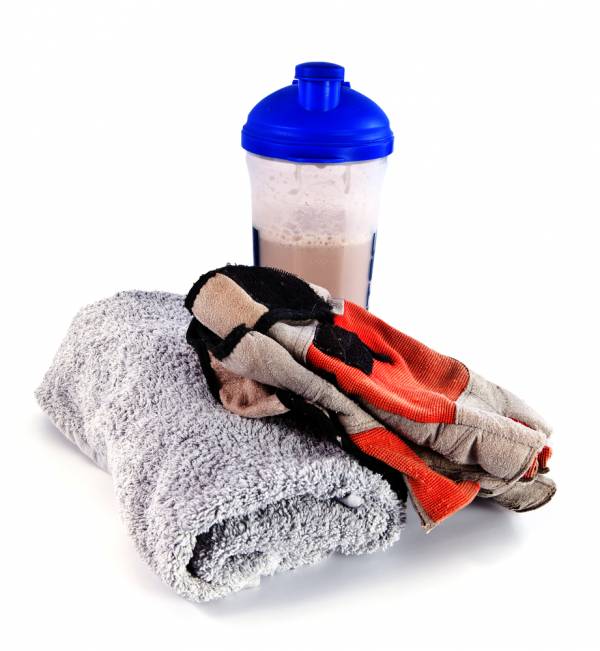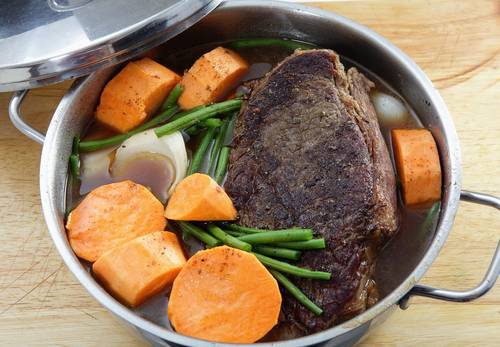For years the most important meal of the day has been said to be breakfast, but I believe that to be wrong. I suspect most of the readers here could agree that with all the effort you put into your training that your post-workout nutrition just may be more important to you than breakfast. In fact, I believe your post-workout meal is one of the most important meals you can have all day.
The reason I believe this is because in a hard workout, you can use up all your stored glycogen, easily sweat over two liters of water, and break down both muscle and red blood cells. This is why what you as an athlete consume in the minutes and hours after your training or competition is so crucial to both performance and recovery. This week I will look at nutrition recovery and explain it’s importance and the best ways to use it to maximize your results.
Recovery is defined in the Webster dictionary as “the act of regaining or returning toward a normal or healthy state.” In recovery nutrition the foods we choose to consume have been shown to positively affect recovery and an athlete’s future performance.
The Goals and Timeframe of Post Exercise Nutrition
“Recovery” covers a range of processes that include:
- Replenishing the muscle and liver glycogen stores
- Consuming protein to assist with muscle repair
- Restoring fluid and electrolytes lost in sweat
- Supporting the immune system to handle the damage
It has been determined that the body’s cells are most receptive to replenishment, particularly glycogen stores, within the first thirty minutes after intense training. Essentially the clock starts ticking for an athlete as soon as they enter their cool down. This is just one part of the equation as recovery nutrition can be broken into two stages – stage one occurs within thirty minutes of the workout and stage two occurs one to two hours after exercise.
Replenishing the Body’s Glycogen Stores
Ingesting carbohydrates after training is critical in replenishing glycogen stores and initiating muscle glycogen synthesis. If we don’t replenish these stores an athlete’s training performance can be compromised in future sessions.
It is recommended that 1.2g per kilogram of bodyweight of carbohydrates be consumed post exercise. Sometimes it is not practical for an athlete to consume such a large quantity of carbohydrates straight after exercise, as they may have difficulties tolerating food or drink. There is a way to combat this, though. Research in the International Journal of Sport Nutrition and Exercise Metabolism has shown that ingesting protein (0.2-0.4g/kg) and a smaller amount of carbohydrates together (around 0.8g/kg) can result in a similar effect, stimulating an endogenous insulin release that actually replenishes glycogen stores at a similar rate as ingesting 1.2g/kg of bodyweight of carbohydrates does.
Building and Repairing Muscle
Muscle protein is broken down due to high intensity or prolonged exercise. This makes recovery nutrition important in helping to rebuild. Once the recovery phase begins the catabolic processes reduce while anabolic processes increase and continue on for at least 24 hours after training. The ingestion of essential amino acids from quality protein sources has been shown to help with the muscle-building process. Even though research continues into the type, amount, and timing of protein consumption to obtain the maximum results, most agree that athletes who do either endurance or resistance type training will get the desired benefit by consuming 20-30g of high quality protein within the first hour post exercise.

Rehydrating the Body
Most athletes will finish a competition or training session in some kind of fluid deficit. If this deficit is not corrected it can have a significant impact on future training sessions. In order to rectify this deficit an athlete should aim to consume 125-150% of the estimated fluid lost over a four to six hour period post exercise.
Including sodium into recovery fluid can assist in replacing the electrolytes lost through excessive sweating. Rather than just losing the fluid through excessive urination, the addition of electrolytes can help the body retain the water consumed. In order to rehydrate effectively, 50-80mmol of sodium should be added. This can be achieved by adding extra electrolytes to commercial sports drinks or consuming fluids created with this ratio. Another alternative is consuming foods that contain sodium along with recovery fluids to achieve this required amount.
Supporting the Immune System
Intensive training can suppress the immune system. This suppression occurs while training is in progress and can continue to affect the efficiency of the immune system for hours afterward. This is obviously a concern for athletes as these hours of decreased immune function could allow an athlete to pick up an infection. Vitamins C and E, zinc, glutamine, and probiotics have all been touted to aid in the protection and support of the immune system. None have been proven to provide a bulletproof defense. There has been research, though, stating that if adequate glycogen stores are maintained pre and post exercise that this can reduce the disturbance of immune system markers as the consumption of carbohydrates can help reduce the bodies stress hormone response to exercise.
Using Supplements or Whole Foods to Meet Your Goals
These days there is a supplement for everything and for some athletes this means that they can get lazy and become totally reliant on sports supplements to meet their recovery goals. Unfortunately this can mean that some athletes end up doubling up on specific nutrients. While inherently this not a bad thing, some minerals taken in excess can cause toxic symptoms, so an athlete needs to be aware of what is in his or her supplements.

Athletes are generally advised to obtain real food options to aid in recovery unless constrained for time. This is because it also allows an athlete to meet the daily nutritional needs of essential vitamins and minerals, and also stock up on much needed antioxidants like vitamins C and E that help reduce oxidization caused from the stress of exercise.
Practical considerations of recovery nutrition also need to be taken into account. Issues like a lack of appetite, unavailability of food, and being unprepared can all play a part in an athlete failing to meet recovery goals. With a little planning these challenges can be nothing more than bumps in the road. Once an athlete notices the benefits, these bumps should be even further minimized, making for a consistent and competitive athlete through something as simple as eating the right foods at the right time.
References:
1. M. Beelen, Burke, L.M., Gibala, M.J., and van Loon, L.J.C. Nutritional strategies to promote postexercise recovery. International Journal of Sport Nutrition and Exercise Metabolism. 2010; 20:515-532.
2. Hayes A and Cribb P. J. Effect of whey protein isolate on strength, body composition and muscle hypertrophy during resistance training. Current Opinion in Clinical Nutrition and Metabolic Care 2008, 11:40-44
3. Nieman DC. Influence of carbohydrate on the immune response to intensive, prolonged exercise. Exerc Immunol Rev. 1998;4:64-76.
4. “Recovery Nutrition.” Sports Dieticians Australia. June 2012
Photos courtesy of Shutterstock.






